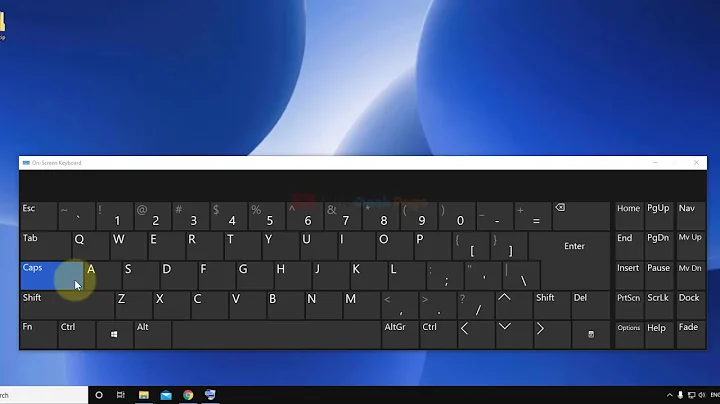How do I turn off Caps Lock (the lock, not the key) by command line?
Solution 1
I don't know of any command line tool for that in Ubuntu. (For Num Lock, there is numlockx .) Here's a one-liner that you can copy-paste into a terminal window:
python -c 'from ctypes import *; X11 = cdll.LoadLibrary("libX11.so.6"); display = X11.XOpenDisplay(None); X11.XkbLockModifiers(display, c_uint(0x0100), c_uint(2), c_uint(0)); X11.XCloseDisplay(display)'
Here it is again in a more expanded form. We use the Python ctypes library to call C functions from the X library directly. The function XkbLockModifiers changes the state of the keyboard locks, on the core keyboard (XkbUseCoreKbd = 0x0100), affecting Caps Lock (2), setting it to 0 (off).
#!/usr/bin/env python
from ctypes import *
X11 = cdll.LoadLibrary("libX11.so.6")
display = X11.XOpenDisplay(None)
X11.XkbLockModifiers(display, c_uint(0x0100), c_uint(2), c_uint(0))
X11.XCloseDisplay(display)
If you have a stuck modifier, change 2 to the mask of the modifiers you want to turn off. The modifiers are 1=Shift, 2=Lock (Caps Lock), 4=Control, 8=Mod1, 16=Mod2, 32=Mod3, 64=Mod4, 128=Mod5. Run xmodmap -pm to see what Mod1 through Mod5 correspond to. For example, to turn off all modifiers, call X11.XkbLockModifiers(display, c_uint(0x0100), c_uint(255), c_uint(0)). To turn on Num Lock which is on Mod2 and at the same time turn off Caps Lock, call X11.XkbLockModifiers(display, c_uint(0x0100), c_uint(2 | 16), c_uint(16)).
Here's a C version if you want to make a small binary instead of invoking Python. Compile with gcc -O -Wall -o caps_lock_off caps_lock_off.c -lX11, with the packages build-essentials and libx11-dev installed.
#include <stdio.h>
#include <X11/X.h>
#include <X11/XKBlib.h>
int main()
{
Display *display = XOpenDisplay(NULL);
if (display == NULL) {
fprintf(stderr, "Couldn't open display\n");
return 2;
}
Bool sent = XkbLockModifiers(display, XkbUseCoreKbd, LockMask, 0);
if (!sent) {
fprintf(stderr, "Couldn't send LatchLockState\n");
return 1;
}
#ifdef REPORT_STATE
XkbStateRec xkb_state;
Status status = XkbGetState(display, XkbUseCoreKbd, &xkb_state);
if (status) {
fprintf(stderr, "XkbGetState returned %d\n", status);
return 1;
}
printf("state.group=%02x\n", xkb_state.group);
printf("state.locked_group=%02x\n", xkb_state.locked_group);
printf("state.base_group=%02x\n", xkb_state.base_group);
printf("state.latched_group=%02x\n", xkb_state.latched_group);
printf("state.mods=%02x\n", xkb_state.mods);
printf("state.base_mods=%02x\n", xkb_state.base_mods);
printf("state.latched_mods=%02x\n", xkb_state.latched_mods);
printf("state.locked_mods=%02x\n", xkb_state.locked_mods);
printf("state.compat_state=%02x\n", xkb_state.compat_state);
printf("state.grab_mods=%02x\n", xkb_state.grab_mods);
printf("state.compat_grab_mods=%02x\n", xkb_state.compat_grab_mods);
printf("state.lookup_mods=%02x\n", xkb_state.lookup_mods);
printf("state.compat_lookup_mods=%02x\n", xkb_state.compat_lookup_mods);
printf("state.ptr_buttons=%02x\n", xkb_state.ptr_buttons);
#endif
int err = XCloseDisplay(display);
if (err) {
fprintf(stderr, "XCloseDisplay returned %d\n", err);
return 1;
}
return 0;
}
Also possibly of interest is a way to temporarily ignore Caps Lock:
xkbset nullify lock
After this, Caps Lock will effectively be permanently off, until you reenable it with xkbset nullify -lock.
Solution 2
Using Xorg automation
Xorg automation tools could be used for sending the required key events.
Note:
For first use, This solution needs you to tape the correct password to install new tool, if your CAPS is currently active:
- Use SHIFT key to type lowercase letters.
- Enable accessibility, overlay virtual keyboard.
- Re-plug an external keyboard. (Thanks to chris455)
- Open office writer, write password there, change the letter case, copy it, then paste it to password dialog.
If all previous options are not possible or don't work, Go with Gilles' answer / python script. It does not need to install any additional tool, it uses only
python&libX11shared lib which are pre-installed.
Using xdotool
-
Install it
sudo apt-get install xdotool -
Send a CAPS down/up event
xdotool key Caps_Lock
Another tool is xte
-
Install it
sudo apt-get install xautomation -
Send a CAPS lock down/up event
xte "key Caps_Lock"
References:
Solution 3
As for Gilles' Python version not working in newer Ubuntus, setting the correct return for the open display seems to do the trick:
#!/usr/bin/env python
from ctypes import *
class Display(Structure):
""" opaque struct """
X11 = cdll.LoadLibrary("libX11.so.6")
X11.XOpenDisplay.restype = POINTER(Display)
display = X11.XOpenDisplay(c_int(0))
X11.XkbLockModifiers(display, c_uint(0x0100), c_uint(2), c_uint(0))
X11.XCloseDisplay(display)
(Code adapted from https://stackoverflow.com/questions/29638210/how-can-i-use-python-xlib-to-generate-a-single-keypress)
Solution 4
If you can't access CAPS because you remapped it in .bashrc, like I did, then simply switching to a virtual terminal (alt+ctl+fN) and then switching back worked for me.
Solution 5
I had this problem and was able to fix it by using the OnBoard keyboard (in Ubuntu Mate, under Universal Access).
Once turned on you should see the CapsLock key is red, or somehow indicated that it is locked on. Then you can press to toggle off.
Related videos on Youtube
Echogene
Updated on September 18, 2022Comments
-
Echogene almost 2 years
For some reason my laptop is stuck in Caps Lock. I have the Caps Lock key mapped by
xmodmaptohyper_l, so I don't have acaps_lockkey to turn it off. Is there a way I can turn it off by command line? It would be nice if I could reset the lock state without resetting my computer, especially for future reference. This has happened before, but I would like to know now how to do it properly this time.-
 One Zero over 12 years[echo -e "$(dumpkeys | grep ^keymaps)\nkeycode 58 = Escape" | sudo loadkeys][1] [Adding the following line to .profile or .bash_profile should disable caps lock:][2] [xmodmap -e "remove lock = Caps_Lock"][3] [1]: askubuntu.com/questions/43986/… [2]: askubuntu.com/questions/43986/… [3]: askubuntu.com/questions/43986/…
One Zero over 12 years[echo -e "$(dumpkeys | grep ^keymaps)\nkeycode 58 = Escape" | sudo loadkeys][1] [Adding the following line to .profile or .bash_profile should disable caps lock:][2] [xmodmap -e "remove lock = Caps_Lock"][3] [1]: askubuntu.com/questions/43986/… [2]: askubuntu.com/questions/43986/… [3]: askubuntu.com/questions/43986/… -
 Pavlos Theodorou over 7 yearssetxkbmap -option caps:none
Pavlos Theodorou over 7 yearssetxkbmap -option caps:none -
 user.dz over 7 years@PavlosTheodorou, that will disable CAPS key, it will not toggle its status as the OP requirement.
user.dz over 7 years@PavlosTheodorou, that will disable CAPS key, it will not toggle its status as the OP requirement. -
 Pavlos Theodorou over 7 yearsthere is a bug there. there is no command currently to do that. you could use setleds +caps or -caps but its not working. the only thing u can do is already answered. you can remap caps
Pavlos Theodorou over 7 yearsthere is a bug there. there is no command currently to do that. you could use setleds +caps or -caps but its not working. the only thing u can do is already answered. you can remap caps
-
-
Echogene over 12 yearsI'll have a go when I'm next on my laptop. I'm on my desktop for now.
-
 quant_dev about 9 yearsWhat if this doesn't work?
quant_dev about 9 yearsWhat if this doesn't work? -
 user.dz almost 9 years@quant_dev, I've added another tool
user.dz almost 9 years@quant_dev, I've added another toolxtecould you give it a try. -
Gringo Suave over 8 yearsCAN'T INSTALL, PASSWORD NOT ACCEPTED. :(
-
 user.dz over 8 years@GringoSuave, open Office writer, write password there, change the letter case, copy it, then paste it to password dialog. Have you tried Gilles's answer, i think it does not need to install any additional tool.
user.dz over 8 years@GringoSuave, open Office writer, write password there, change the letter case, copy it, then paste it to password dialog. Have you tried Gilles's answer, i think it does not need to install any additional tool. -
Gringo Suave over 7 yearsHmm, the python method used to work for me, but after upgrading to Yakkety it does not. The bug where caps lock gets stuck persists of course!
-
h3. over 7 years@GringoSuave I have no idea why that could be. Please install
xtraceand runxtrace python -c 'from ctypes import *; X11 = cdll.LoadLibrary("libX11.so.6"); buf = (c_char*16)(); display = X11.XOpenDisplay(None); X11.XkbLockModifiers(display, c_uint(0x0100), c_uint(2), c_uint(0)); X11.XkbGetState(display, 0x0100, buf); X11.XCloseDisplay(display)'and post the last few lines, starting with the one containingQueryExtension name='XKEYBOARD'. I don't claim that I'll understand the output but I'll try. -
Gringo Suave over 7 yearsI get a segfault: terminated by signal SIGSEGV (Address boundary error) Segmentation fault…
-
Gringo Suave over 7 years000:<:0005: 20: Request(98): QueryExtension name='XKEYBOARD' 000:>:0005:32: Reply to QueryExtension: present=true(0x01) major-opcode=135 first-event=85 first-error=137 000:<:0006: 8: XKEYBOARD-Request(135,0): UseExtension major=1 minor=0 000:>:0006:32: Reply to UseExtension: major=1 minor=0
-
h3. over 7 years@GringoSuave Does it work (as in, get to the end of the program) without
xtrace? Add; from binascii import *; print hexlify(buf.raw)at the end of the program to display the state. If this still crashes, what if you changec_char*16toc_char*100? -
h3. over 7 years@GringoSuave And please try the C version as well, compiled with
gcc -O -Wall -DREPORT_STATE -o caps_lock_off caps_lock_off.c -lX11as well as without-DREPORT_STATE -
Gringo Suave over 7 yearsIt runs fine however the problem happens rarely so not easy to check. I use the caps lock key as ctrl.
-
 user.dz over 7 years@Gilles, Still your python script is the best, That C program have same drawback like my answer. It requires dependency installation and password entry. However, python solution is copy/paste/run solution quick and easy. I want to give my already collected rep in this post for that to your answer. :) I can't stop going back to your answer to see how you implemented it, it is really a nice snip to learn from.
user.dz over 7 years@Gilles, Still your python script is the best, That C program have same drawback like my answer. It requires dependency installation and password entry. However, python solution is copy/paste/run solution quick and easy. I want to give my already collected rep in this post for that to your answer. :) I can't stop going back to your answer to see how you implemented it, it is really a nice snip to learn from. -
 Mark K Cowan over 7 years+1 for
Mark K Cowan over 7 years+1 forxkbset nullify lock, that worked (after installing from AUR) where the Python script just segfaulted. Now added to X startup script. -
Daniel H almost 7 yearsI kept getting a return of 1 from the libx11 stuff, but the very last part about
xkbsetworked perfectly. -
 labyrinth over 6 yearsSwitching didn't quite do it, but it did get me to a point where I could press caps lock to get thing right.
labyrinth over 6 yearsSwitching didn't quite do it, but it did get me to a point where I could press caps lock to get thing right. -
chris544 over 6 yearsYou can use Shift keys for inputting lowercase letters while Caps Lock is enabled.
-
chris544 over 6 yearsIf you use an external keyboard another option could be re-plugging it; Caps Lock modifier might get reset, so you can input lowercase letters.
-
 Håken Lid almost 6 yearsI tried running the python script, but this line gives me a segfault:
Håken Lid almost 6 yearsI tried running the python script, but this line gives me a segfault:>>> X11.XkbLockModifiers(display, c_uint(0x0100), c_uint(2), c_uint(0))Error:Segmentation fault (core dumped). Any idea what's wrong? -
h3. almost 6 years@HåkenLid The Python script calls low-level code directly in a way that requires very little code, but the downside is that there's nothing to validate that it's calling the code correctly. However the low-level interfaces that this script uses are pretty much set in stone. What version of Ubuntu are you using? On what processor architecture? Do other GUI applications start — can you run e.g.
xterm? This proof-of-concept script does crash if it can't connect to the X server. Addprint displayunder the linedisplay = …, what does it print? -
 Caleb almost 6 yearsThe python version used to work for me too but stopped doing so a while back on all my Archlinux machines. Connecting to the X server is not the issue. The C version here compiled and works.
Caleb almost 6 yearsThe python version used to work for me too but stopped doing so a while back on all my Archlinux machines. Connecting to the X server is not the issue. The C version here compiled and works. -
gtrak about 5 yearsI had a segfault on python (2) but it worked on python3
-
Garret Gang about 5 yearsThis works really well, is a life saviour
-
Seth Robertson almost 5 yearsThe python code used to work but now does not. See the @diegogs answer below for one that still does.
xset nullify lockfixed the problem on some applications (emacs) but not others (terminator). It does not work either before or after. xdotool works. -
 Alfe over 4 yearsI also got the SegFault using Python2, and it also worked for me using Python3, so my immediate problem is solved. Nevertheless, I wanted to know what's going on in Python2. Inserting some printf-debugging showed that the segfault appears on the
Alfe over 4 yearsI also got the SegFault using Python2, and it also worked for me using Python3, so my immediate problem is solved. Nevertheless, I wanted to know what's going on in Python2. Inserting some printf-debugging showed that the segfault appears on theXbdLockModifiers()call.X11is shown as<CDLL 'libX11.so.6', handle 55a04db6bd00 at 7f7f6573e110>,displayas some arbitrary int (changes with every call). I also had a look at what thec_uint()s returns, but that was unobtrusive. I don't know why Python2 fucks up, but I propose to change the answer to use Python3. What do you think? -
h3. over 4 years@Alfe Right now I'm on an Ubuntu 16.04 machine and the oneliner works for me with both python2 and python3. I have an Ubuntu 18.04 chroot on this machine and the oneliner segfaults with both python2 and python3. I don't know why it behaves differently for different people.
-
Javi about 4 yearsGreat solution, thank you. I installed "onboard" which is a very simple onscreen keyboard and that solved it.
-
TFuto about 4 yearsStuck Caps-Lock in VMWare 15.5, Ubuntu 20.04 LTS. Only worked xautomation so far.




